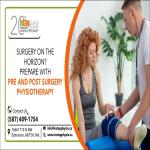Surgery, whether elective or necessitated by trauma, marks a significant event in an individual's life. While the operative procedure itself is vital, what follows afterward, specifically the rehabilitation phase, plays a pivotal role in ensuring a complete return to function. At the heart of this phase is physiotherapy. In locations like Windermere, where the populace is active and health-conscious, the demand for quality physical therapy services is evident.
Understanding the Post-Operative Body
After undergoing a surgical procedure, the body initiates its natural healing process. This phase is characterized by localized inflammation, pain, potential stiffness, and compromised mobility. There's also the challenge of managing surgical wounds or incisions. Depending on the type of surgery, certain patients may experience pronounced muscle weakening, partly from the surgical intervention and partly from prolonged periods of inactivity or immobilization.
Why Physiotherapy Matters
Physiotherapy is not merely a complementary treatment; it's fundamental in post-operative care. Introducing it early can mitigate pain, optimize the healing environment, and prevent potential complications. By attending to swelling, reinforcing mobility, and progressively improving muscle strength, physiotherapy fosters an environment conducive to healing. Clinics in Windermere underline the importance of a tailor-made approach, ensuring each patient's unique needs are addressed.
Key Components of Post-Op Physiotherapy
- Pain Management: Beyond conventional pain medications, physiotherapy offers non-invasive pain management techniques. This might involve modalities like cold compression, heat therapy, ultrasound treatments, or TENS (Transcutaneous Electrical Nerve Stimulation).
- Mobility Training: Early movement, even if it's minimal, is pivotal. Initially, this may involve a passive range of motion exercises, transitioning to more active exercises, ensuring joint flexibility and preventing joint stiffness.
- Strengthening Exercises: Counteracting muscle atrophy requires dedicated strengthening exercises. A structured program progressively intensifies to challenge and rebuild weakened muscles.
- Functional Training: Every patient has unique daily activities or hobbies they hope to return to. Functional training ensures that their rehab program is aligned with these goals, whether it's climbing stairs without pain or returning to competitive sports.
- Scar Tissue Management: After surgery, scar tissue can form, which might hinder movement. Physiotherapy employs specific techniques like massage and mobilization to manage and reduce scar tissue, enhancing flexibility and reducing the risk of complications.
- Balance and Coordination Training: Particularly for surgeries related to the lower extremities or those that affect the vestibular system, training to improve balance and coordination is pivotal to preventing falls and improving functional movement.
- Edema Control: Post-surgical swelling or edema can be discomforting and potentially delay recovery. Physiotherapy incorporates methods like elevation, compression garments, and manual lymphatic drainage to manage and reduce swelling.
- Breathing Exercises: Especially relevant for patients who've had thoracic or upper abdominal surgeries. These exercises ensure optimal lung function post-surgery, aiding oxygenation and overall healing.
- Neuromuscular Retraining: Surgeries, particularly those involving the spine or nervous system, might necessitate retraining the muscles to respond adequately to nerve signals, ensuring proper movement patterns and function.
- Patient Education: Equipping the patient with knowledge about their condition, the recovery process, and ways to expedite healing is a cornerstone of post-op physiotherapy. This might involve teaching them about the dos and don'ts, how to manage pain, and techniques to aid recovery at home.
Physiotherapy: Setting the Bar High
With its state-of-the-art treatment options and emphasis on individualized care, Windermere's physiotherapy services, especially at establishments like Momentum Physiotherapy, stand out. They understand the unique challenges presented by different surgeries and craft treatment protocols that cater to individual needs.
The Long-Term Benefits
Physiotherapy’s advantages aren't merely short-lived. By ensuring optimal joint mobility, enhancing muscle strength, and reinforcing functional abilities, physiotherapy Windermere lays the foundation for long-term health. Adhering to the principles of physical therapy Windermere minimizes potential post-operative setbacks, ensuring patients lead an active, pain-free life.
The Integral Role of Physiotherapy in Complete Healing
In the world of medical treatments, surgeries often stand out as significant milestones. They represent both an end to a particular ailment and the beginning of a recovery journey. It's this latter phase—recovery—where physiotherapy takes center stage. Based in Windermere, facilities like Momentum Physiotherapy understand the nuanced needs of post-operative patients, offering them a roadmap to regain strength, mobility, and confidence.
Physical therapy, especially as practiced in Windermere, moves beyond the immediate aftermath of an operation. It’s not just about healing the wound but restoring the person. Through pain management, mobility enhancement, and functional training, physiotherapy ensures that the surgical intervention's benefits are fully realized, leading to optimal outcomes. It also addresses the potential side effects of surgeries, like scar tissue formation and muscle atrophy, ensuring a comprehensive recovery.
To encapsulate, the true success of a surgery is determined not just by the surgeon's precision but also by the quality of post-operative care. In this continuum of care, physiotherapy emerges as a keystone, bridging the gap between a medical intervention and a patient's return to their fullest potential.
Also read about:
Surgery on the Horizon Prepare with Pre and Post Surgery Physiotherapy
Motor Vehicle Accident Physiotherapy Rehabilitation Strategies
Equilibrium Excellence The Essentials of Vestibular Physiotherapy
















